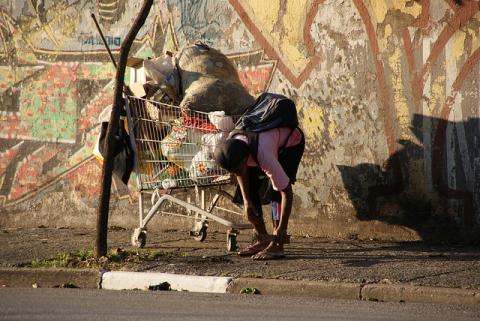
Our feet bear witness to all that we do in our lives. They wear the mud and dirt from the places we travel. They are hardened and callused from the miles we put on them. They are painted and lotioned for special occasions. They adjust for the weight of our loads, lightly padding as we lay our children to sleep, or solidly plodding as we carry our groceries on our backs.
In São Paulo, Brazil, one of the world’s most populous cities, the feet of more than 12 million people are in a wide variety of condition. The children run by in their flip-flops, toes gripping their rubber soles in a magical effort to keep them on their feet. Teenagers buff their white faux leather sneakers and cute little flats. Women stroll in heels not made for the city’s uneven streets, covered in rhinestones and flowers. Aunties and grandmothers shuffle past in low, dark colored flats. Men get home to their families in their black dress shoes, their work boots, tennis shoes or flip flops. Men and women and children of the street bare their testimonies with dirt, cuts, blackness, and swelling. People carry their histories with them by the soles of their feet. They carry the grime of this city, the dog excrement, the dirty rainwater.
This is the image that Christ leaves us with today: the washing of the callused, rough, dirty feet.
Jesus teaches in today’s Gospel that He comes to wash us and our dirty, swollen feet. The Son of God comes to serve us. Jesus Christ came to serve us, and as he serves us, we must serve others.
When we contemplate our concerns for this world, we need to reflect on our service to others. Are we so caught up in financial outcomes, the laurels of work, and a competitive society that we lose the message of love, freely given by our God, that Jesus taught us to model? Do we encourage service to others?
For World Mission Day, I spoke with the youth group at my local parish in São Paulo, Brazil. Their leader, Dari, wanted my husband and I to explain our work as missioners – what we do, and why. We explained that our work is exactly what Jesus modeled for us – service to others. Here in Brazil, we work with people in prison, with immigrants and refugees, and with at-risk youth, and together create new pathways to a peaceful live with dignity.
This kind of service does not require leaving home and living abroad. Some people may be called to that life – overseas mission is a witness to God’s love that will always offer a unique perspective and will always be valuable – but service to others can be done in our daily routines wherever we live. Pay attention in your community. When the bus stops, see who gets on, if they need your seat more than you do, stand up. When you’re driving to work, be kind and let that harried driver cut you off before the merge. Reach out to your neighbor. Get off the computer and make personal connections. Offer to watch their child before the bus comes in the morning, so that they can get to work on time. When you are mowing your lawn, do theirs too. Not out of a sense of righteousness, but because you have the time and the skill.
It is easy feel that we shouldn’t get involved for fear of doing or saying the wrong thing. But with the confidence of God’s love, we have nothing to lose. When you discover that someone is going through a hard time, acknowledge it and be there with them. When you see someone being belittled or attacked, stand with them. Instead of judging the parent with the screaming child in the grocery store, offer an understanding word or smile. In today’s world of fear and violence, look for the helpers. Be a helper.
St. Peter instructs Jesus to wash all of him, not to stop at his feet. He dives in completely, professing his devotion to serve completely. With his entire body, the clean and the callused, he pledges to serve others. This is the rock our Church was founded on. We are a church of service. This is our calling. Jesus gives us a challenging responsibility: to be open to receiving the kindness from others, and to be humble enough to serve others.
Photo: Woman stops to repair her shoe on a street in São Paulo, Brazil, by Flickr user Ben Tavener and licensed in the creative commons 2.0.
